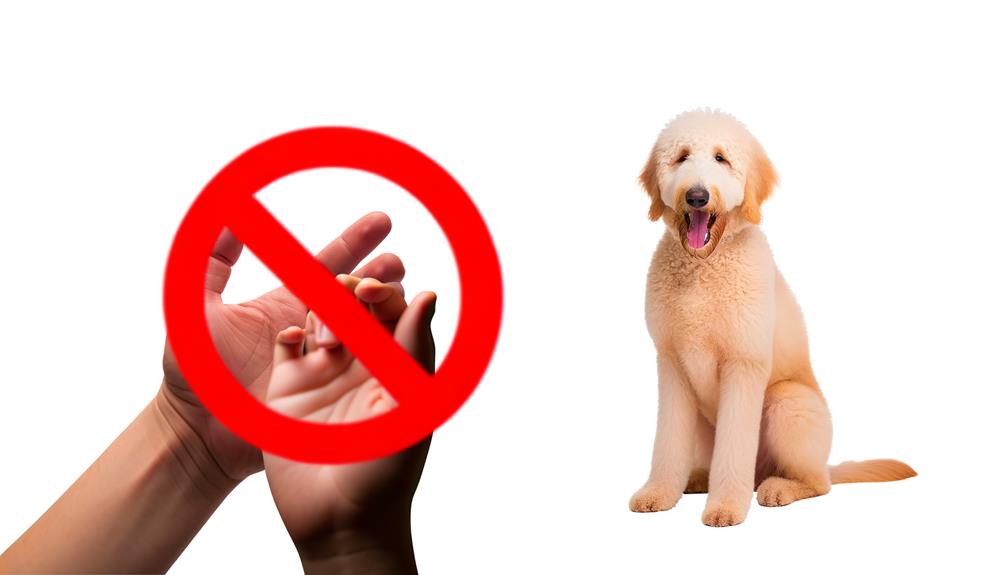In my experience, I found a range of strategies to stop my Goldendoodle From nipping, from diverting their attention to different activities, to teaching them specific commands, and even seeking professional help when necessary. With a good dose of patience and persistence, I was able to help my Goldendoodle express their excitement in a more appropriate way, which not only strengthened our bond but also ensured we could live together peacefully.
Taming my Goldendoodle’s tendency to nip when excited was certainly a challenge. This lively, high-energy breed often uses nipping as a way to communicate, especially in their most lively moments. However, after understanding why they behave this way and employing effective, consistent training techniques, I noticed a significant reduction in this behavior.
- Key Takeaways To Stop My Goldendoodle From Nipping
- Explaining A Goldendoodle's Excitement Biting
- Techniques to Redirect Goldendoodle's Attention
- Managing Goldendoodle's Playtime Biting
- Addressing Goldendoodle's Boredom and Anxiety
- Dealing With Aggressive Goldendoodle Behaviour
- Frequently Asked Questions
Key Takeaways To Stop My Goldendoodle From Nipping
- Goldendoodle’s excitement biting can be triggered by teething, overexcitement, established habits, boredom, and stress.
- Effective strategies to stop Goldendoodle from biting require understanding excitement biting.
- Attention can be redirected using favored toys, commands, distractions, and positive reinforcement.
- Managing playtime biting involves stopping play, rewarding calm behavior, redirecting biting onto appropriate objects, and maintaining consistency among family members.
Explaining A Goldendoodle’s Excitement Biting
Goldendoodle’s excitement biting is often triggered by factors such as teething, overexcitement, established habits, boredom, and stress. A normal phase in puppy development, teething can initiate this habit. When the biting persists post-teething, identifying the underlying cause becomes vital.
The breed’s natural prey drive and overexcitement can lead to biting during play. Redirecting their attention with chew toys can help curb this behavior. Established habits and boredom can also contribute to excitement biting. Mitigation of these triggers involves providing mental and physical stimulation, which reduces the likelihood of biting.
Formulation of effective strategies to stop a Goldendoodle from biting requires understanding its excitement biting. Using techniques like teaching the ‘leave it’ command, increasing mental and physical stimulation, and addressing potential stressors can significantly discourage biting.
In extreme cases, where the biting behavior persists despite these interventions, seeking professional help may be necessary. A canine behaviorist or trainer can provide specialized assistance, ensuring the Goldendoodle learns appropriate ways to express excitement without resorting to biting.
Techniques to Redirect Goldendoodle’s Attention
Goldendoodles can have their attention redirected by several effective techniques, which can help manage excitement biting. These methods are designed to engage their senses and minds in different ways, diverting them from biting.
A favored toy can be a powerful tool in this endeavor. Introduce the toy when your Goldendoodle shows signs of excitement to shift their focus away from biting and towards something more suitable and enjoyable.
Strategic use of commands is another technique. A well-trained Goldendoodle can respond to commands like ‘No,’ ‘Stop,’ or ‘Sit’ to halt unwanted behavior. For maximum effectiveness, these commands should be used consistently and firmly.
Distractions, such as a sudden noise or a change in environment, can also prove useful in redirecting attention. It’s important to ensure these distractions do not cause fear or anxiety in your Goldendoodle.
Positive reinforcement is essential in these techniques. Reward your Goldendoodle for successfully shifting their attention from biting, which reinforces the desired behavior and makes it more likely to occur in the future.
With patience and consistency, these techniques can effectively manage your Goldendoodle’s excitement biting.
Managing Goldendoodle’s Playtime Biting
Goldendoodles are lively and playful by nature, but they may often express their excitement and exuberance through biting. This biting behavior, while not aggressive, can escalate if not correctly managed. Hence, it’s crucial to closely monitor your pet’s actions during playtime and intervene when necessary.
If your Goldendoodle starts to bite, you should immediately stop playing and calmly say a firm ‘no.’ This helps your pet make the association between biting and the end of playtime. Rewarding your pet for calm behavior and gently discouraging biting tendencies is also beneficial. Using toys to divert the biting behavior onto appropriate objects can teach your Goldendoodle what they can and cannot bite.
It’s crucial to be consistent when managing your Goldendoodle’s playtime biting. Make sure all family members follow the same rules to avoid confusing your pet. With patience and consistent training, the incidences of nipping during playtime can be significantly reduced.
Addressing Goldendoodle’s Boredom and Anxiety
Goldendoodles can overcome boredom and anxiety through various strategies such as engaging play, consistent exercise, and crate training. Interactive games and puzzles offer mental stimulation to keep boredom at bay. Adding mentally engaging toys and feeders to a Goldendoodle’s daily routine can prevent them from biting out of boredom.
Physical exercise on a regular basis is critical for managing a Goldendoodle’s boredom and anxiety. Regular walks, play sessions, and even dog sports help burn off energy, control anxiety, and reduce destructive behaviors. A consistent exercise routine helps ensure the Goldendoodle gets the required activity.
Crate training offers a safe haven for a Goldendoodle during stressful times, thus addressing separation anxiety in dogs. This secure environment can soothe anxiety when you’re not around, preventing anxious nipping.
If a Goldendoodle’s anxiety and boredom persist despite these efforts, it’s best to consult a professional. Certified dog trainers or behaviorists can provide strategies tailored for the specific needs of a Goldendoodle, ensuring a happier and healthier existence.
Dealing With Aggressive Goldendoodle Behaviour

Aggressive behavior in Goldendoodles can be caused by a myriad of reasons such as teething, overexcitement, learned habits, boredom, stress, anxiety, or fear. It’s critical to identify the triggers if your Goldendoodle is biting and work on solutions to stop this behavior.
Managing aggression in Goldendoodles necessitates a mix of strategies. Consistent training is key, which involves instructing your Goldendoodle commands like ‘leave it’ or ‘drop it’ to discourage biting or nipping when excited. Unwanted behavior can be overlooked while good behavior should be rewarded to help reduce aggressiveness.
Ensuring your Goldendoodle receives ample physical and mental stimulation can help avoid boredom, which is a trigger for biting. This can be facilitated by offering chew toys, participating in routine exercise, and providing mental stimulation activities.

